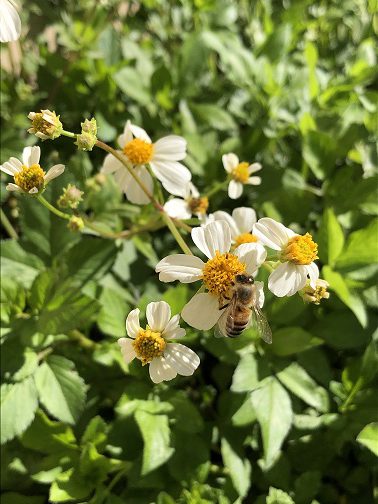
A weed is only a weed if you call it a weed (note this does not apply to ‘noxious weeds’ which are federally and state regulated). That is very true for one of our most popular native weeds, Bidens alba. This plant goes by many nicknames such as beggar-ticks or beggar weed, or more affectionately as Spanish needles. Spanish needles grows profusely in areas that receive full sun and particularly in areas that have been disturbed such as road medians, fields, landscapes and in gardens. This one pictured here is growing in my front yard and was being frequented by hungry honey bees.
Although it can be considered a nuisance, this plant is an incredibly important food source for our honey bees and native pollinators. It is one of the few wildflowers that blooms profusely in the winter like it is now, providing critical nectar for pollinators until the spring flush. According to the Florida Wildflower Foundation, it is considered the third most common source of nectar for honey production. It is also a host plant for the Dainty Sulphur butterfly. Adults lay their eggs on these wildflowers and the caterpillars that emerge eat it until they pupate into butterflies.
Bidens alba spreads rapidly by seeds that like to cling to fur and clothing, including gardeners’ gloves and pants as they try to remove the plants that volunteer in their flower beds. So, rather than trying to eradicate this native wildflower entirely, try to find solace in the beauty of its white flowers and the joy of watching a great diversity of pollinators enjoy its sweet nectar. After all, a weed is only a weed if you call it a weed.
 0
0
